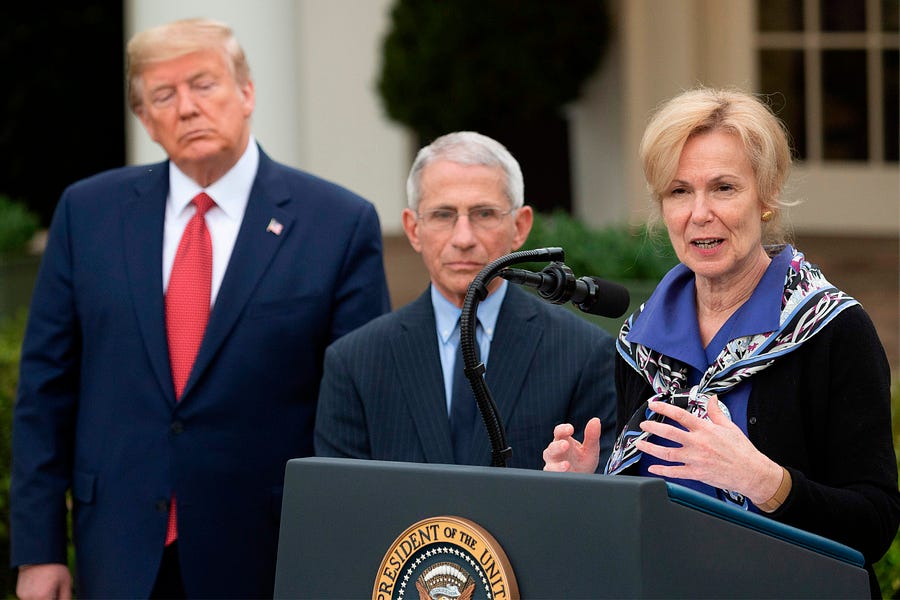As the coronavirus pandemic took hold in the United States this spring, no two Americans jumped more quickly from relative obscurity to national fame than did Dr. Anthony Fauci and Dr. Deborah Birx. As the science-side face of the White House’s COVID response team, the two public health experts helped reassure countless Americans terrified of what the future might hold that the national strategy was being overseen by capable minds. In recent weeks, however, their fortunes have diverged sharply.
A onetime fixture of the White House’s daily coronavirus briefings, Fauci’s public appearances as a mouthpiece of the administration are much diminished. The White House has moved to limit his media appearances, and when he does speak publicly these days, it’s usually with the air of a disinterested subject-matter expert rather than one with the authority of the federal government behind him: He has reportedly not briefed the president since early June.
In recent weeks, this chilly treatment has morphed increasingly into open hostility. President Trump has repeatedly called Fauci out over both his past and present assessments of the virus, even as he insists their relationship remains strong. Last week, he publicly disputed Fauci’s claim that the nation was still “knee-deep” in the virus, then took an extra potshot: “Dr. Fauci said don’t wear masks and now he says wear them. And he said numerous things. Don’t close off China. … We would have been in much worse shape.” He told Sean Hannity that Fauci “is a nice man, but he’s made a lot of mistakes.” He has retweeted posts associating Fauci with the Democrats and suggesting that public health authorities have been lying about the virus.
Others at the White House got in on the action over the weekend. One administration official released what amounted to an oppo file on Fauci to the Washington Post, saying that “several White House officials are concerned about the number of times Dr. Fauci has been wrong on things” with an attached list of comments Fauci made in the early days of the pandemic. And top White House aide Dan Scavino posted a comic from alt-right cartoonist Ben Garrison on Facebook that disparagingly depicted “Dr. Faucet” leaking and pouring cold water on America’s economy.
Nobody who’s paid attention to the way President Trump runs his administration could be surprised by any of this. Fauci, a longtime public official who had accumulated rock-solid bipartisan bona fides before entering Trump’s orbit, is exactly the sort of person the president relishes taking down a peg. Further, plenty of prominent voices in pro-Trump media took an early dislike to the doctor and spent the last few months darkly suggesting the president could not trust him. It’s a measure of the unusual gravity of the pandemic that the falling-out took as long as it did.
One explanation of the rift is straightforward: Trump, weary of fighting the virus, has simply decided to push forward with a triumphant narrative of getting back to business, and is sidelining Debbie Downers like Fauci as a result. But now consider Dr. Birx, who also has not shied away from bad COVID news. Last Friday, she struck a similar tone to Fauci in cautioning Americans not to get too cheerful about current death rates remaining low: “We have not seen this result in increased mortality, but that is expected as the disease continues to spread in some of our large metro areas.”
Yet as the Wall Street Journal reported last week, Birx remains as influential as ever within the White House, and is currently “playing a central role in crafting the administration’s response to the resurgence of the virus in Florida, Texas, Arizona, California and other states.”
If Fauci and Birx are striking the same unflinching tone about the virus, why has one incurred Trump’s displeasure while the other maintains his favor? The answer seems to have less to do with the president’s specific coronavirus strategy than with his general managerial philosophy.
Over the course of the Trump presidency, it’s been continually remarked that the president is a terrible boss, at least as these things are generally accounted. He pits his staffers against each other, fostering an institutional environment of chaos. He scapegoats and berates them for failures publicly and privately. He says explosive and outrageous things, lets them go to bat in his defense, then hangs them out to dry by changing his own position or explanation without warning.
Yet there’s a method to all this madness. Trump, as Politico’s Tim Alberta put it in his 2019 book American Carnage, is “someone who values professional utility over personal relationships in the people he deals with, someone who shows regret for nothing he says or does, and someone who prizes loyalty above every other characteristic.” The nonstop humiliations to which the president subjects his underlings is a way to reaffirm that most important characteristic.
Here, it seems, is where Trump ultimately found Fauci unacceptable. The doctor might have gone out of his way to insist to the public that he and the president were working harmoniously. He might even have implored the press to focus on the fight against the virus rather than becoming preoccupied with intra-White House politics during a time of crisis. But he never took pains to prove himself Trump’s man. Just the opposite: He never bothered to hide his feelings about the challenges presented by Trump’s ignorance and impetuousness.
Birx has plainly made the opposite calculus: If occasionally swallowing her pride to behave like a comms staffer is the price of remaining relevant in her work, it’s a price she is willing to pay. She has praised the president effusively when given the opportunity, and made a press secretary-worthy effort to bat away questions from reporters that could embarrass him. “It bothers me that this is still in the news cycle,” she said in April when asked about Trump’s off-the-cuff comments about using sunlight or disinfectants to kill the virus inside the body. “Because I think we’re missing the bigger pieces of what we need to be doing as an American people to continue to protect one another.”
This strategy too comes with a cost: In saying what she needs to say to remain relevant at the White House, Birx risks losing her credibility with much of the rest of the country. It’s also a tightrope that doesn’t get any easier to walk the longer you practice. Plenty of other well-meaning and well-respected people have made the attempt and succeeded for a while, but eventually most either give up and leave—think Jim Mattis, for instance—or devolve fully into say-anything flacks, like Larry Kudlow. Only time will determine which path proves the wiser.
Photograph by Jim Watson/AFP via Getty Images.






Please note that we at The Dispatch hold ourselves, our work, and our commenters to a higher standard than other places on the internet. We welcome comments that foster genuine debate or discussion—including comments critical of us or our work—but responses that include ad hominem attacks on fellow Dispatch members or are intended to stoke fear and anger may be moderated.
With your membership, you only have the ability to comment on The Morning Dispatch articles. Consider upgrading to join the conversation everywhere.